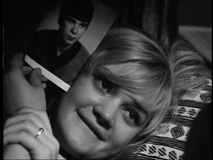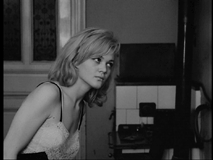|
Newest Reviews:
New Movies -
The Tunnel
V/H/S
The Tall Man
Mama Africa
Detention
Brake
Ted
Tomboy
Brownian Movement
Last Ride
[Rec]≥: Genesis
Hara-Kiri: Death of a Samurai
Indie Game: The Movie
Abraham Lincoln: Vampire Hunter
Old Movies -
Touki Bouki: The Journey of the Hyena
Drums Along the Mohawk
The Chase
The Heiress
Show
People
The Strange Affair of Uncle Harry
Pitfall
Driftwood
Miracle Mile
The Great Flamarion
Dark Habits
Archives -
Recap: 2000,
2001, 2002,
2003, 2004
, 2005, 2006,
2007 , 2008
, 2009 ,
2010 , 2011 ,
2012
All reviews alphabetically
All reviews by star rating
All reviews by release year
Masterpieces
Screening Log
Links
FAQ
E-mail me
HOME
| |
Loves of a Blonde (Milos Forman) 1965
 One of the seminal works of the Czech New Wave movement that
occurred in the mid 1960ís, Milos Formanís brilliant Loves of a Blonde
remains a thoroughly engaging and accessible movie almost forty years later. Set
in overly militarized Czechoslovakia, the film tells a simple tale about a
teenaged girl who works in a shoe factory as she latches onto a traveling
pianist at a government sponsored dance, and ends up going to bed with him. From
this simple premise, which at first appears at most to be an affectionate
portrait of the lives that these characters lead, there emerges an unstated, but
obvious, criticism of the Czech way of life and the rigidity of their morality.
It questions how romance is meant to blossom in a state where love interests are
doled out like meat or sugar (and with a ratio of sixteen women to each man, who
can blame them?) and chastises the willingness of people to squash happiness in
such a context. Thankfully, the polemic never becomes overbearing, as most of
the film floats along with a buoyant sense of youthful optimism. Teenagers might
be more given to heedless romantic notions, but a very real sense of hopefulness
exists in their folly.
One of the seminal works of the Czech New Wave movement that
occurred in the mid 1960ís, Milos Formanís brilliant Loves of a Blonde
remains a thoroughly engaging and accessible movie almost forty years later. Set
in overly militarized Czechoslovakia, the film tells a simple tale about a
teenaged girl who works in a shoe factory as she latches onto a traveling
pianist at a government sponsored dance, and ends up going to bed with him. From
this simple premise, which at first appears at most to be an affectionate
portrait of the lives that these characters lead, there emerges an unstated, but
obvious, criticism of the Czech way of life and the rigidity of their morality.
It questions how romance is meant to blossom in a state where love interests are
doled out like meat or sugar (and with a ratio of sixteen women to each man, who
can blame them?) and chastises the willingness of people to squash happiness in
such a context. Thankfully, the polemic never becomes overbearing, as most of
the film floats along with a buoyant sense of youthful optimism. Teenagers might
be more given to heedless romantic notions, but a very real sense of hopefulness
exists in their folly.
 Forman somehow manages to craft comedy that neither veers from the challenges of
realism nor reeks of shameless manipulation. With expert timing that could
challenge the very best of American screwball, his razor-sharp observations of
everyday life become increasingly comic as the movie progresses. A sequence near
the beginning, set in the fateful dancehall, proceeds nearly wordlessly, but
loses none of its emotional impact as a result. Mixing the performances of
non-professionals with those by trained actors, he creates a seamless collection
of characters that seem to take on allegorical weight as the film draws toward a
conclusion. The lack of ostentatious camera tricks concentrates our attention
squarely on the drama, and Forman never cheapens the action by allowing it to
feel in any way stereotypical or by focusing on the titillating aspects of the
plot. His attractive lead actors actually look their age, and their awkward,
tentative lovemaking certainly is endearing. Overall, the sureness that the
director shows here, in one of his earliest works, is quite impressive, and the
film clearly ranks among his best. The surprisingly mature ending is just about
as perfect as endings to films that we donít want to end can be, showing that
sometimes an outright lie might be the only context in which hope can exist.
Forman somehow manages to craft comedy that neither veers from the challenges of
realism nor reeks of shameless manipulation. With expert timing that could
challenge the very best of American screwball, his razor-sharp observations of
everyday life become increasingly comic as the movie progresses. A sequence near
the beginning, set in the fateful dancehall, proceeds nearly wordlessly, but
loses none of its emotional impact as a result. Mixing the performances of
non-professionals with those by trained actors, he creates a seamless collection
of characters that seem to take on allegorical weight as the film draws toward a
conclusion. The lack of ostentatious camera tricks concentrates our attention
squarely on the drama, and Forman never cheapens the action by allowing it to
feel in any way stereotypical or by focusing on the titillating aspects of the
plot. His attractive lead actors actually look their age, and their awkward,
tentative lovemaking certainly is endearing. Overall, the sureness that the
director shows here, in one of his earliest works, is quite impressive, and the
film clearly ranks among his best. The surprisingly mature ending is just about
as perfect as endings to films that we donít want to end can be, showing that
sometimes an outright lie might be the only context in which hope can exist.
* * * * Masterpiece
04-25-02
Jeremy Heilman
|